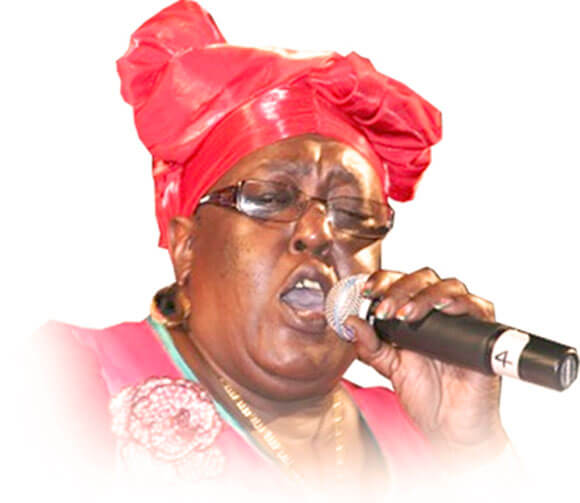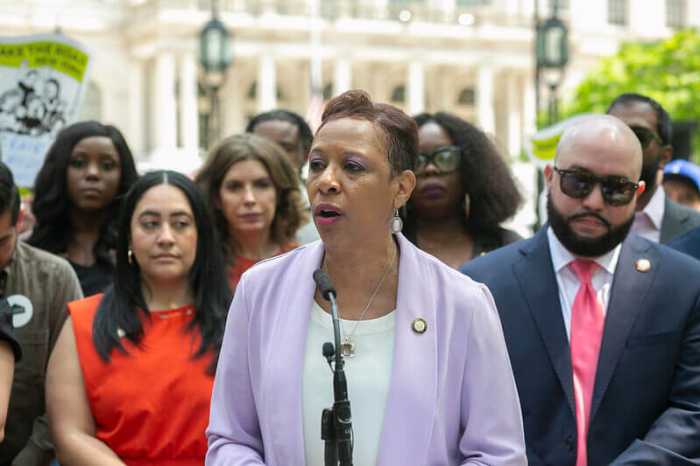Trinidad and Tobago calypso legend and former Calypso Monarch, Sandra “Singing Sandra” Des Vignes-Millington — renowned for hits such as “Voices from the Ghetto,” “Beyond Tears” and “Nobody Wins A War” — died on Thursday, Jan. 28. She was 64.
Singing Sandra, who was born in 1957 in East Dry River and raised in Morvant, in Trinidad, won the Trinidad and Tobago Calypso Monarch titles in 1999 and 2003.
Trinidad and Tobago Newsday said that Singing Sandra, the second woman to win the Calypso Monarch contest in the twin-island republic, was regarded as the “Mother of the Calypso Fraternity.”
The publication said it understood that she died at Mt. Hope Medical Complex.
Another Trinidad and Tobago publication, the Trinidad Express, reported that, in 2015, Singing Sandra “spent weeks on the Intensive Care Unit of the Port-of-Spain General Hospital after undergoing surgery for a hernia.”
“For decades, Singing Sandra, a former two-time Calypso Monarch, not only entertained national and international audiences with her many calypsos, but she was seen as an educator via her songs,” said Randall Mitchell, Trinidad and Tobago’s minister of Tourism, Culture and the Arts, in a statement.
“Long before the ‘Time’s Up’ and the ‘Me Too’ movements took root, Singing Sandra embraced the women’s movement and provided our women with the rallying call to ‘die with their dignity’,” he said.
“Singing Sandra was true to her word,” Mitchell added. “And, as we mourn her passing, the citizens of Trinidad and Tobago in general, and the cultural fraternity, in particular, will always be thankful for her contribution which has made us a richer nation.”
According to Wikipedia, the free online encyclopedia, Singing Sandra was born in a poor family and faced many hardships through her early teenage years.
“Singing Sandra never met her father, and she was the only child of the family, but her singing talent was evident from an early stage, given that her grandmother was the best singer in her village in Tobago,” Wikipedia said. “She was baptized in spiritual Baptist church when she was 15 years old; and, during her later stage of her life, she became a practicing orisha.”
From an early age, Wikipedia said Singing Sandra “sang and acted as a child, and performed various small productions named ‘Best Village’ productions.
“She was rebellious and barely attended school, because she was looking to work to make money,” it said. “As a result, she worked in various low-income jobs and continued doing so till her 20s.”
While Singing Sandra never finished school, Wikipedia said, in her mid-20s, she was approached in 1984 by calypsonian Dr. Zhivago to perform two of his songs.
The following year, she was recruited to the Mighty Sparrow’s Youth Brigade tent at carnival.
“Her exceptional talent and persistence in hard work and in music resulted in her winning the National Calypso Queen in 198,” Wikipedia said. “From that moment and after, her career accelerated at an exponential rate.”
She went on to win the Carifesta Monarch and Calypso Queen of the World titles in 1992, and she performed at the Reggae Sunsplash festival in 1992, Wikipedia said.
Later, it said Singing Sandra formed the group, United Sisters, along with Lady B, Tigress, and Marvellous Marva.
“Yet, she continued to perform as a solo artist and, consequently, won the ‘Best Nation Building Song’ award, along with a $5,000 prize, at the 1997 carnival for the song ‘One Destiny One Heart,’” Wikipedia said. “As a result of her career as an artist, she was a well-respected musician of soca.”
Her achievements were numerous, according to Wikipedia, being the second woman to win Trinidad and Tobago’s Calypso Monarch title, winning in 1999 with the songs “Song for Healing” and “Voices from the Ghetto.”
She was able to finish in third place in 2000 and in fifth place during 2001’s festival, Wikipedia said.
In 2003, it said Singing Sandra she won the Calypso Monarch title for a second time, with “For Whom the Bell Tolls” and “Ancient Rhythm”, winning a Honda Civic car and a $70,000 cash prize, becoming the first female calypsonian to win the title twice.
She placed third in 2005 and second in 2006, Wikipedia said.
Caribbean Beat magazine said that East Dry River, Morvant and Laventille, where Singing Sandra went to school, are “all low-income, high-creativity communities.”
“That real ghetto,” Singing Sandra had told the magazine proudly. “No regrets. Growing up in the ghetto teaches you something of value.
“Having to struggle, I had to leave school at the age of 15 to help my mother,” she said. “I worked as a waitress, a bakery attendant, grocery attendant, the road [maintenance] programs. I’ve been there.
“You find more love in these areas than you find in the sophisticated areas,” she added. “You may send your child by me — go and ask Miss Sandra, if she has some butter, she could give me a piece, some salt, some whatever. And we would share that.
“We share a kind of love that people who are not from the ghetto would not understand,” Singing Sandra continued. “People have to take care of each other here.”
Ever since 1992, when they fired up a calypso, “Why Can’t A Woman Win A Road March,” and 1993, when their massive party hit “Whoa Donkey” came close to providing the answer, Caribbean Beat said the United Sisters had been turning Trinidad and Tobago’s “soca hierarchy upside-down.”
The magazine said Sandra and her comrades were all top-drawer calypsonians, “but their sexy sister act is something else.”
It said Singing Sandra was frustrated when the United Sisters’ “Whoa Donkey” was edged out by Superblue’s “Bacchanal Time” for Road March champ.
“Donkey should have been Road March, and they rob us like hell,” Caribbean Beat quoted Singing Sandra as saying then. “That’s because it’s a male-dominated art; women have to stand behind men and t’ing like that.
“I said to someone a few days ago, men tend to say that because of a certain part of King James’s version of the Bible — woman was created from a rib from Adam,” she added. “And I said, ‘Listen to me, when you see Adam tell him that Sandra said he can come back and take his rib, because women can stand on their own.’ I mean thank Adam, but God would have created us anyway.”



















